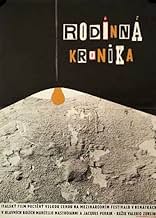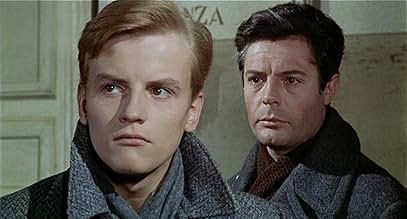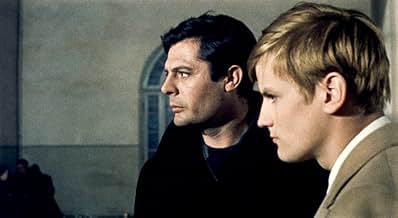IMDb-BEWERTUNG
7,2/10
1269
IHRE BEWERTUNG
Füge eine Handlung in deiner Sprache hinzuA man recalls the life of his late younger brother.A man recalls the life of his late younger brother.A man recalls the life of his late younger brother.
- Auszeichnungen
- 5 Gewinne & 3 Nominierungen insgesamt
Angelo Casadei
- Un visitatore all'ospedale
- (Nicht genannt)
Empfohlene Bewertungen
How this one slipped off the radar screen is beyond understanding. Against a very muted palette of tone on tone, in which the character Lorenzo's beige over-coat becomes a metaphor of his indefinite link with the beige walled world, director Zurlini weaves a fascinating story of two brothers separated at birth, who effect a tragic reunion in war torn Italy.
Marcello Mastiroianni here offers a performance of greater depth than "La Dolce Vita" (which is just as it should be)but it is youngster Jacques Perrin's "Lorenzo" which surprises.
His performance, (indeed the whole film) is a study in the power of the reticence, understatement and the unsaid. Mr. Perrin's eyes, particularly in the hospital sequences, speak those volumes and light those vistas that would be trivialized in dialog form.
An excellent film with a core of deep sadness, that avoids the fatal commercial trap of sentimentalism.
Marcello Mastiroianni here offers a performance of greater depth than "La Dolce Vita" (which is just as it should be)but it is youngster Jacques Perrin's "Lorenzo" which surprises.
His performance, (indeed the whole film) is a study in the power of the reticence, understatement and the unsaid. Mr. Perrin's eyes, particularly in the hospital sequences, speak those volumes and light those vistas that would be trivialized in dialog form.
An excellent film with a core of deep sadness, that avoids the fatal commercial trap of sentimentalism.
I wept like I hadn't wept in a movie for years. Director Valerio Zurlini and his cinematographer Giuseppe Rotunno gives us a visual symphony in browns and dark yellows. The faces of the brothers Enrico and Lorenzo played with shattering truth by Marcello Mastroianni and Jaques Perrin have made a home in my brain. Their reunion with their grandmother, played by the sublime Sylvie, is an image, a film moment that I shall never forget. As it happens more often than not, the Italians have released this gem in DVD without English subtitles - not in English or any other language for that matter. I'm grateful for speaking and understanding Italian well enough to enjoy this movie to the fullest. If you do as well, I recommend it wholeheartedly.
10Aw-komon
Phew! What a beautiful film! I'd rank this as one of the most awe-inspiringly composed and photographed color films of all time. You've never seen Mastroianni, until you've seen him in this film, walking around like an iconic black ghost in the darkly hued existentialist-to-the-nth-degree technicolor universe of post-war Italy created by Zurlini and legendary DP Giussepe Rottuno. What a stroke of genius to contrast the bleakest and most depressing of subjects possible with the most fantastically poetic and gorgeous technicolor cinematography this side of `Black Narcissus.' This is one of Rottuno's finest works ever: full of absolutely breathtaking deeper than deep blacks and colors that seem to have sprouted from some otherworldly weathered, neo-realist hallucination. And what timeless subtly paced, unerringly poetic, intelligent and completely uncompromising direction by Zurlini, the forgotten genius of Italian cinema, whose style in this film can be roughly described as a unique melange of neo-realism, Antonioni, Michael Powell, Jacques Becker, early Pasolini and early Bertolucci. It's easy to imagine how easily this story of a tubercular writer grieving the death of his younger brother through a series of flashbacks could've turned into not much more than a melodramatic tearjerker; yet in Zurlini's hands and through the incredible, tour-de-force performance of Marcello Mastroiani in the lead role, the Marxist-proleteriat-plight-of-the-poor sentimentality at the film's core transcends itself and becomes a deeply affecting, painful and ultimately cathartic meditation on death, despair, and the possibilities of redemption in the direst of circumstances.
In war-ravaged Italy, tubercular journalist Marcello Mastroianni (as Enrico) learns little brother Jacques Perrin (as Lorenzo) has passed
In flashback, we learn the brothers were separated upon the death of their mother, and led different lives. They are reunited as estranged adults, grow to love each other as brothers, and are again separated by death. The co-starring lead actors give it all the believability they can muster - which, when you have Mastroianni and Perrin acting, is considerable - but, there is a noticeable age difference, they never look deathly ill, and are each distractingly handsome. As a result, they often seem more like lovers than brothers. Shameless as ever, Sylvie (as Grandmother) claims it's "easy to see" that they are brothers. Well, okay. Director Valerio Zurlini and cameraman Giuseppe Rotunno make this English-retitled "Family Diary" look amazingly beautiful - herein, a old radiator against a stark wall is a work of art. They, and the haunting performances, do make it worth watching.
******* Cronaca familiare (9/62) Valerio Zurlini ~ Marcello Mastroianni, Jacques Perrin, Sylvie, Salvo Randone
******* Cronaca familiare (9/62) Valerio Zurlini ~ Marcello Mastroianni, Jacques Perrin, Sylvie, Salvo Randone
In 1945, Enrico Corsi (Marcello Mastroianni) receives news of his younger brother Lorenzo's death. He recalls their earlier lives. Their mother had died from complications giving birth to Lorenzo. With their father sick, Lorenzo was raised by an English baron's butler as a gentleman while Enrico was raised by their poor grandmother. Next, they run into each other in 1935. They have been estranged from each other and from their sick father. History is recounted as they come to terms with their brotherhood. Enrico has the drive from his poverty. Lorenzo has no ambition and struggles to find a steady job. His pretty face is not enough. He joins medical trials and falls ill.
Whether it's Enrico's narration or the dialogue, everything is in a hush tone. It is a sad grinding descend. It's a little distancing especially when we're told about his bad marriage but never meet his wife. There are a lot of talking but it feels melodramatic. Mastroianni remains a master. I don't think I can stay with this movie without him.
Whether it's Enrico's narration or the dialogue, everything is in a hush tone. It is a sad grinding descend. It's a little distancing especially when we're told about his bad marriage but never meet his wife. There are a lot of talking but it feels melodramatic. Mastroianni remains a master. I don't think I can stay with this movie without him.
Wusstest du schon
- WissenswertesJacques Perrin had already played a boy named Lorenzo in the previous movie by Valerio Zurlini, "Girl with a Suitcase"
- PatzerIn the later sequence in the hospital, there are hairs on the film in several scenes.
- VerbindungenReferenced in Close-Up: Why do We Need the Venice Film Festival? (2024)
Top-Auswahl
Melde dich zum Bewerten an und greife auf die Watchlist für personalisierte Empfehlungen zu.
Details
- Laufzeit
- 1 Std. 53 Min.(113 min)
- Sound-Mix
- Seitenverhältnis
- 1.85 : 1
Zu dieser Seite beitragen
Bearbeitung vorschlagen oder fehlenden Inhalt hinzufügen

























